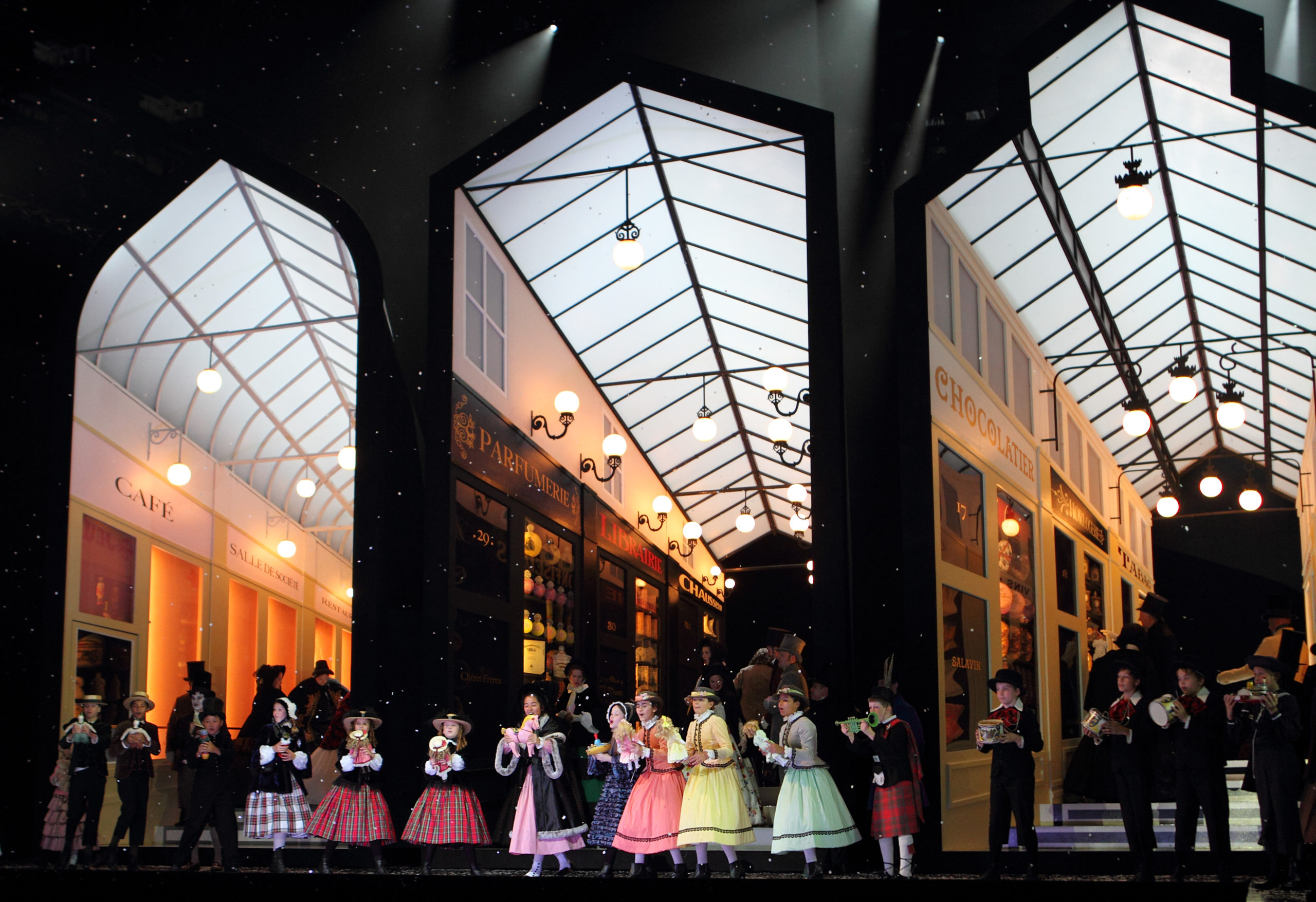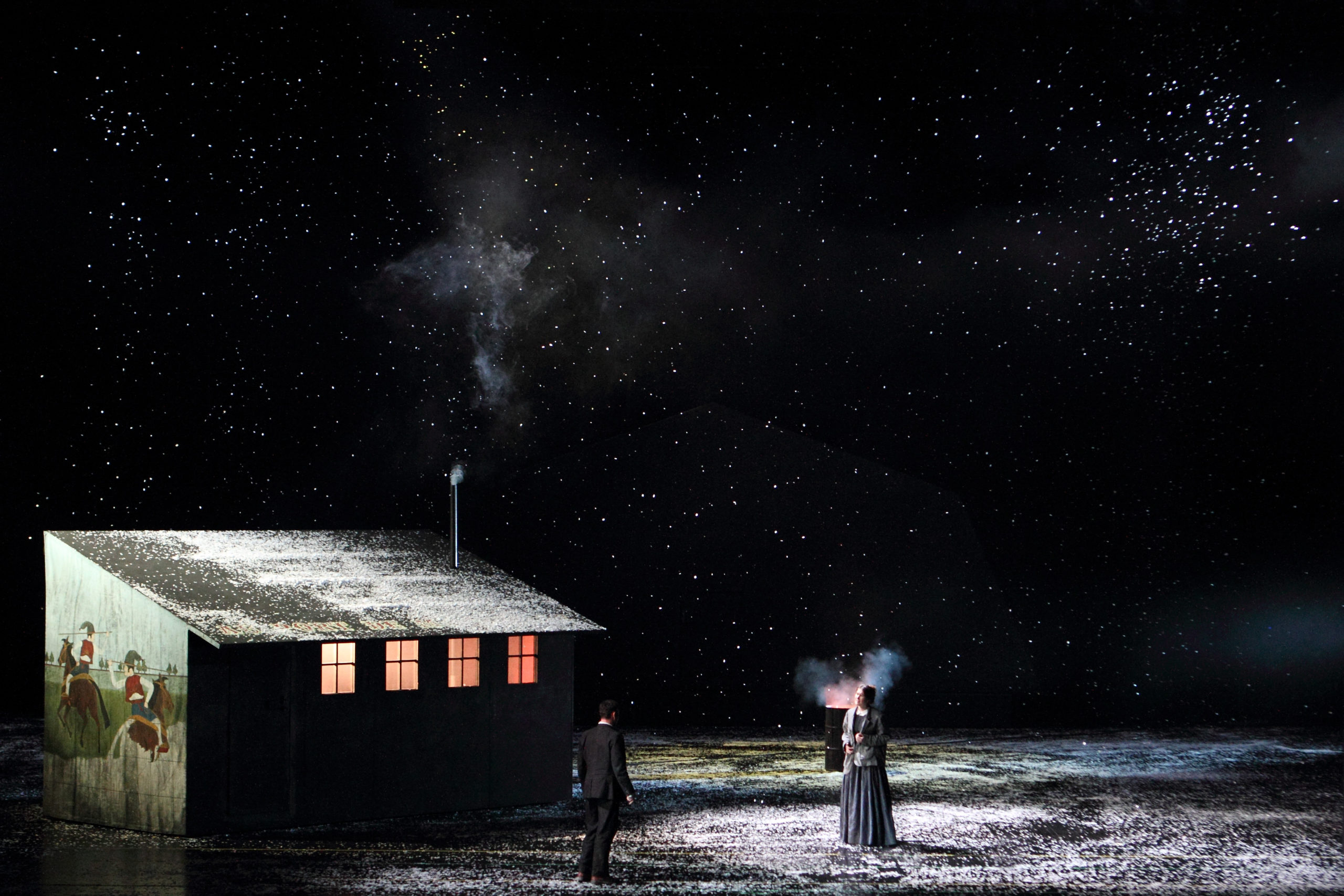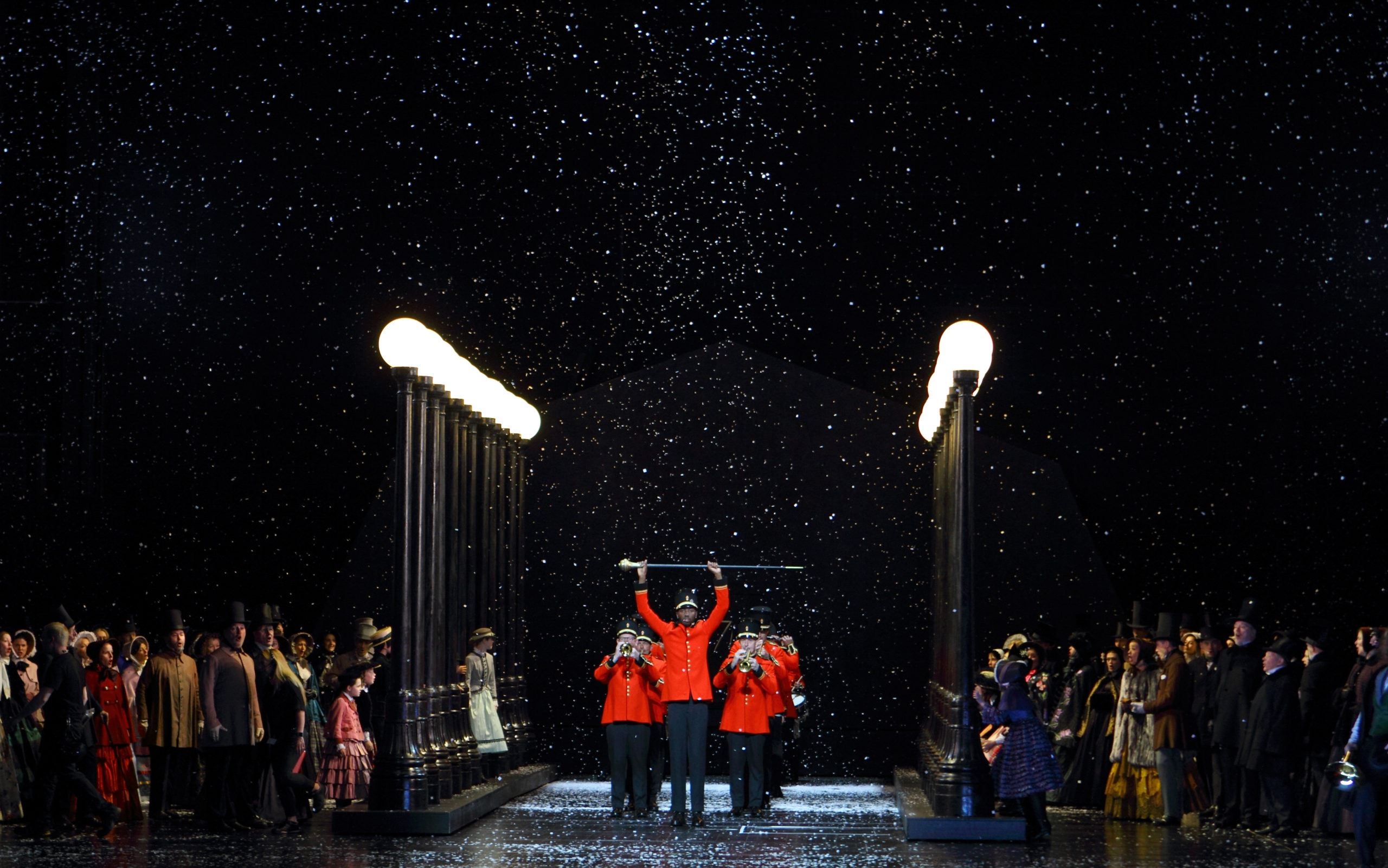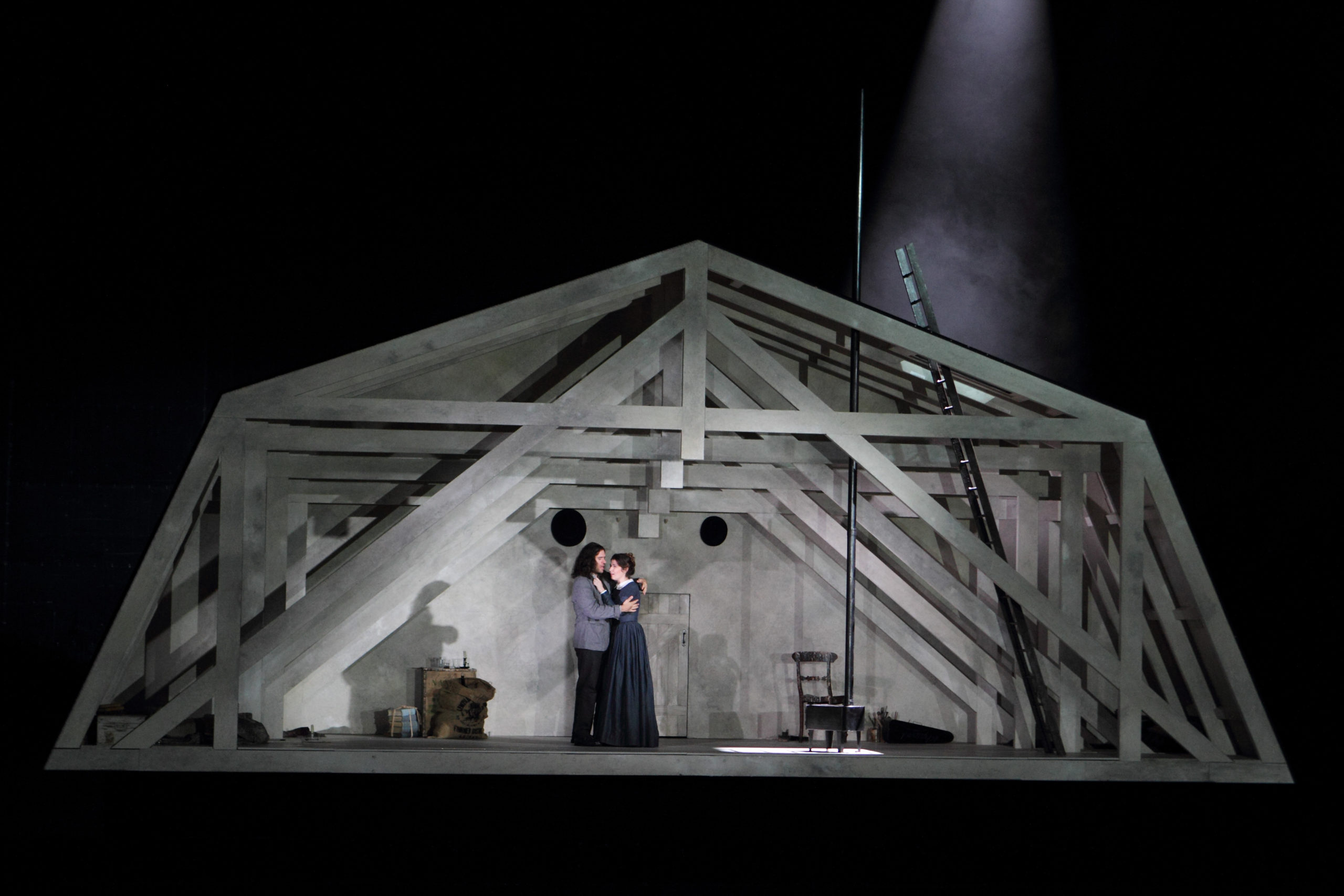ROYAL OPERA: LA BOHÈME – LIVE
“La Boheme” (Puccini) From Covent Garden:
Wed. Jan 29th @ 7.45PM.
Giacomo Puccini (1858 – 1924) is one of the great success stories among composers – he made a fortune from his operas and purchased an estate near his birthplace. He had a passion for cars and wildfowl hunting. He was also extremely popular with female operagoers and was quite famous as a ladies’ man. He saw Verdi’s “Aida” in Pisa in 1876 and ever after he felt that he had a God-given mission to compose operas. He died in 1924 with his final opera, “Turandot”, unfinished – his attachment to cigarettes was a contributing factor.  “La Boheme” premiered in the Teatro Regio in Turin on Feb. 1st, 1896. The legendary Arturo Toscanini was at the podium. ‘Good news travels fast’ and it had its first performance in Covent Garden as early as 1897, just the following year. Soon legendary singers such as Nellie Melba, Enrico Caruso and our own ‘mastersinger’, John MacCormack, (he sang the role of Rodolfo many times: one such occasion was in Chicago in 1918 with the celebrated songbird, Amelita Galli-Curci) made it one of the most popular of all operas – and today it’s as much-loved as ever. Within twenty years of that premiere it had achieved worldwide popularity, a status it has never lost. And many an impoverished impresario has been grateful to the composer when a production of ‘Boheme’ has replenished dwindling coffers.
“La Boheme” premiered in the Teatro Regio in Turin on Feb. 1st, 1896. The legendary Arturo Toscanini was at the podium. ‘Good news travels fast’ and it had its first performance in Covent Garden as early as 1897, just the following year. Soon legendary singers such as Nellie Melba, Enrico Caruso and our own ‘mastersinger’, John MacCormack, (he sang the role of Rodolfo many times: one such occasion was in Chicago in 1918 with the celebrated songbird, Amelita Galli-Curci) made it one of the most popular of all operas – and today it’s as much-loved as ever. Within twenty years of that premiere it had achieved worldwide popularity, a status it has never lost. And many an impoverished impresario has been grateful to the composer when a production of ‘Boheme’ has replenished dwindling coffers.  A production of “La Boheme” from Covent Garden is always a noteworthy event in the world of opera, made all the more delightful for us when it’s being brought live to us here in Dungarvan at SGC. With its mixture of knockabout fun and poignant moments, along with some gorgeous arias duets and ensembles, few can resist its allure. And it’s even more welcome when the role of Mimi is sung, as in this production, by a vocalist of the calibre of Sonya Yoncheva, one of the finest of modern-day sopranos. It’s amoving, simple and romantic story with the audience engaged by the sad plight of its doomed young couple. It’s an everyday story of ordinary people who just might be neighbours’ children.
A production of “La Boheme” from Covent Garden is always a noteworthy event in the world of opera, made all the more delightful for us when it’s being brought live to us here in Dungarvan at SGC. With its mixture of knockabout fun and poignant moments, along with some gorgeous arias duets and ensembles, few can resist its allure. And it’s even more welcome when the role of Mimi is sung, as in this production, by a vocalist of the calibre of Sonya Yoncheva, one of the finest of modern-day sopranos. It’s amoving, simple and romantic story with the audience engaged by the sad plight of its doomed young couple. It’s an everyday story of ordinary people who just might be neighbours’ children. Early critics protested that “Boheme” wasn’t ‘a patch on’ “Manon Lescaut” (1893), his third opera –a verdict few would agree with today. Its composition wasn’t all ‘sweetness and light’ – Puccini was never easy on his scriptwriters, generally having a prickly relationship with his librettists. (Giuseppe Giacosa, one the co-librettists of “La Boheme’, wrote of the composer’s constant meddling their work: “I am sick to death of this constant redoing, retouching, piecing together”.) It’s interesting today to note that one of those who had worked on the libretto of ‘Lescaut’ was Ruggiero Leoncavallo, the composer of “I Pagliacci” (one of the operas at the 2020 Blackwater Valley Opera Festival) – but Puccini had ‘sacked’ him midway through the process. The upshot of it all was that both composers took on the task of composing on opera based on a novel and play by Henry Murger, titled “Scenes of Bohemian Life”. Operatic history tells us that Puccini’s ‘Boheme’ carried the day and Leoncavallo’s version is rarely if ever performed.
Early critics protested that “Boheme” wasn’t ‘a patch on’ “Manon Lescaut” (1893), his third opera –a verdict few would agree with today. Its composition wasn’t all ‘sweetness and light’ – Puccini was never easy on his scriptwriters, generally having a prickly relationship with his librettists. (Giuseppe Giacosa, one the co-librettists of “La Boheme’, wrote of the composer’s constant meddling their work: “I am sick to death of this constant redoing, retouching, piecing together”.) It’s interesting today to note that one of those who had worked on the libretto of ‘Lescaut’ was Ruggiero Leoncavallo, the composer of “I Pagliacci” (one of the operas at the 2020 Blackwater Valley Opera Festival) – but Puccini had ‘sacked’ him midway through the process. The upshot of it all was that both composers took on the task of composing on opera based on a novel and play by Henry Murger, titled “Scenes of Bohemian Life”. Operatic history tells us that Puccini’s ‘Boheme’ carried the day and Leoncavallo’s version is rarely if ever performed.  The scene is set in a poverty-stricken district of Paris in 1830, where live four young male artistic types, all penniless. It’s bitterly cold and food, fuel and ‘booze’ are at a premium. When the landlord comes looking for the rent they ply him with drink and bundle. Three of them head for a local café, leaving the fourth, the poet, Rodolfo, doing some work. He is soon interrupted by a knock on the door: enter Mimi, a seamstress, sadly suffering from tuberculosis, asking for a light for her candle. She drops her key and Rodolfo’s candles is also quenched. As they search in the dark for her key, their hand’s touch. He sings “Che Gelida Manina” (Your tiny hand is frozen) as he launches on one of the most haunting arias in all opera; she sings her aria, “Mi chiamano Mimi”, (They call me Mimi). Then they sing a magical duet “O Soave Fanciulla” (Lovely maid in the moonlight) – and it’s the rare listener who isn’t smitten by the preceding twenty-five minutes of music -one of the most famous musical sequences in all opera.
The scene is set in a poverty-stricken district of Paris in 1830, where live four young male artistic types, all penniless. It’s bitterly cold and food, fuel and ‘booze’ are at a premium. When the landlord comes looking for the rent they ply him with drink and bundle. Three of them head for a local café, leaving the fourth, the poet, Rodolfo, doing some work. He is soon interrupted by a knock on the door: enter Mimi, a seamstress, sadly suffering from tuberculosis, asking for a light for her candle. She drops her key and Rodolfo’s candles is also quenched. As they search in the dark for her key, their hand’s touch. He sings “Che Gelida Manina” (Your tiny hand is frozen) as he launches on one of the most haunting arias in all opera; she sings her aria, “Mi chiamano Mimi”, (They call me Mimi). Then they sing a magical duet “O Soave Fanciulla” (Lovely maid in the moonlight) – and it’s the rare listener who isn’t smitten by the preceding twenty-five minutes of music -one of the most famous musical sequences in all opera.
Puccini’s “La Boheme” is a lovely, feel good, if ultimately tragic opera and when performed to the highest standards is a life-enhancing experience. It’s something to look forward eagerly to seeing it. Be there.
Jim Ryan